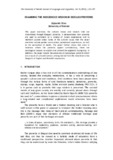| dc.contributor.author | Otiso, Zipporah | |
| dc.date.accessioned | 2016-06-02T08:14:39Z | |
| dc.date.available | 2016-06-02T08:14:39Z | |
| dc.date.issued | 2016 | |
| dc.identifier.uri | http://hdl.handle.net/11295/96020 | |
| dc.identifier.uri | https://linguistics.uonbi.ac.ke/basic-page/university-nairobi-journal-linguistics-and-languages | |
| dc.description.abstract | This paper examines the cultural values and wisdom that are transmitted through Ekegusii proverbs. It demonstrates how proverbs are used to comment on a variety of human experiences and to maintain societal order. Some of the cultural issues that the paper examines include gender construction, paradoxical experiences, as well as the perception of death. The paper further shows that even in instances where the proverbs appear contradictory, there are sociological reasons to explain and unravel the apparent incongruity. In addition, the paper reveals the existence of synonymous proverbs which are a result of cultural contact, arising mainly from the translation (into Ekegusii) of English and Kiswahili expressions. | en_US |
| dc.language.iso | en | en_US |
| dc.publisher | University of Nairobi | en_US |
| dc.rights | Attribution-NonCommercial-NoDerivs 3.0 United States | * |
| dc.rights.uri | http://creativecommons.org/licenses/by-nc-nd/3.0/us/ | * |
| dc.subject | University of Nairobi Journal of Linguistics and Languages | |
| dc.title | Examining the indigenious wisdom in Ekegusii proverbs | en_US |
| dc.type | Article | en_US |
| dcterms.subject | | |



